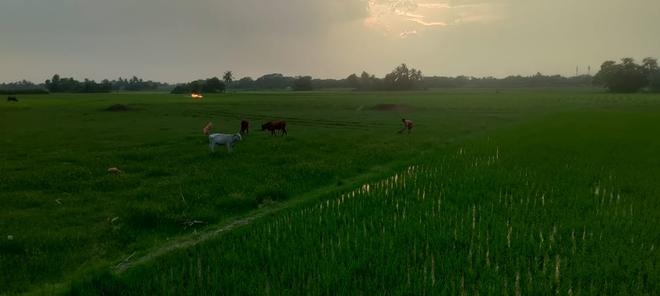The story so far:
For over a year, over a dozen villages identified for the State Industries Promotion Corporation of Tamil Nadu (SIPCOT) Phase-III near Cheyyar town in Tiruvannamalai district, remained a hotbed of protests over SIPCOT’s move to initiate the process of land acquisition for its expansion activities. These villages include Melma, Narmapallam, Kurumbur, Thethurai, Nedungal, Athi, Vada Alapirandan, Veerapakkam and Lianeerkundram
Originally in 1995, SIPCOT had acquired 645 acres of land in Mangal, Chellaperumbulimedu and Mathur villages to set up its first phase of industrial complex near Cheyyar town.
However, the land was lying vacant till 2006. Thereafter the State government allotted 364 acres of the acquired land to various industries in the following three years. The Cheyyar industrial complex is part of the Chennai-Ranipet-Hosur industrial corridor promoted by the State government to attract investment then.
Currently, 13 companies are functioning in the complex that provides direct employment to 27,432 persons and indirect employment to 75,000 persons, mostly locals. Over a decade ago, SIPCOT acquired 2,300 hectares for its Phase - II work there. Subsequently, 55 companies are operating in its Phase - II complex where 31,645 persons were directly employed and over one lakh persons were indirectly employed.
Against this backdrop, SIPCOT’s plans to acquire vast tracts of land for its Phase - III project have triggered mass protests by the farmers and the local residents.

The issue flared up on November 4, 2023, when Anakavoor police arrested 20 persons, mostly affected farmers and their organisers, under IPC sections 143, 147, 294 (B), 341, 353 adn 506 (1) and the Public Property Act 1984. They were accused of agitating against the project since July 2.
This prompted prominent members of the civil society led by social activist Aruna Roy of Mazdoor Kisan Shakti Sangathan (MKSS) on November 14 to appeal to Chief Minister M. K. Stalin to release them.
To make matters worse, on November 16, Tiruvannamalai Collector B. Muresh invoked the Goondas Act, 1970 against seven of the arrested persons based on the recommendations of K. Karthikeyan, SP (Tiruvannamalai).
Following severe criticism from various quarters including political parties and social activists, the Chief Minister a day later said he had ordered the revoking of detention of six of the seven persons under the Goondas Act. However, cases filed on all arrested 20 farmers will continue.
What is the position of the Tamil Nadu Government and SIPCOT?
The SIPCOT and the State Government see the land acquisition for the proposed Phase - III project as essential for industrial development. The proposed project will provide employment opportunities especially for local educated youth including women graduates.
It also contended that of the total identified 3,174 acres for proposed Phase - III project, only seven acres are cultivable land and remaining are wastelands. Also, notices have been issued only to owners of 1,200 acres, which are uncultivable land. The Government said of the total 1,881 land owners in the identified land area, only 239 land owners have given their written objection to the proposed project.
What is the contention of the landowners?
Those whose lands have been identified for the SIPCOT Phase - III project claim most of the identified farming lands are under cultivation with paddy, groundnuts, sugar cane, banana, tomatoes, brinjal, green chillies and ladies finger. They fear loss of livelihood as they might not be adequately compensated.
Why is the government’s stand?
Minister for Public Works, Highways, and Minor Ports E.V. Velu, who represents the Tiruvannamalai Assembly constituency, and SIPCOT have maintained that land owners will be compensated adequately. The loss of livelihood for the affected families will also be addressed.
What is the way forward?
Local social activists, farmers associations and elected representatives say in coordination with SIPCOT, Tiruvannamalai district administration should work to gain the trust of affected farmers by addressing their concerns including compensation packages and alternative employment. Police personnel should be gradually reduced from the affected villages to allow them to return to normalcy. A jurisdictional court on November 20, 2023, granted conditional bail to the arrested farmers but one of them continues to face Goondas Act provisions. With most of the landowners being small and marginal farmers with minimal landholdings, their livelihood also remains affected. Hence, they feel the question of providing them with permanent jobs in the companies of the Phase - III complex for affected families should be addressed to gain the confidence of the local community.







